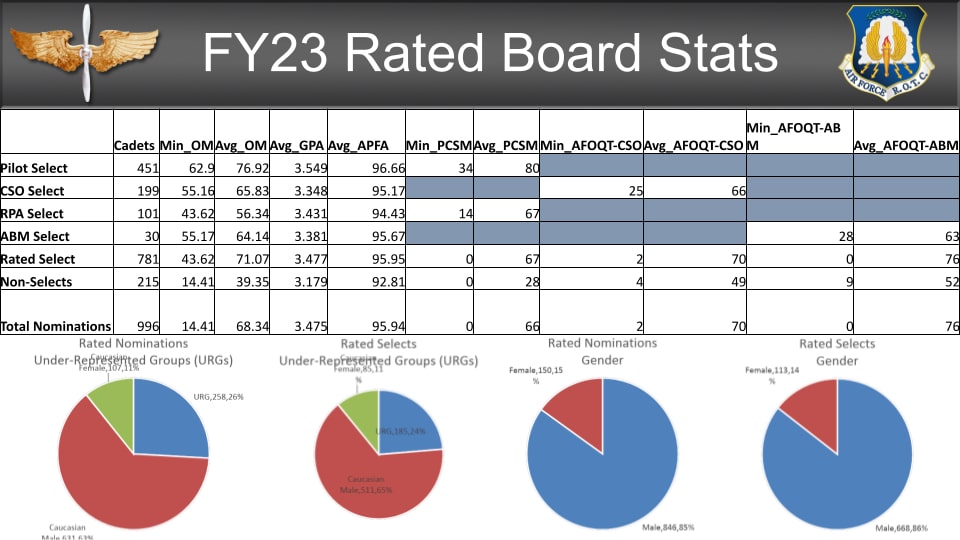Rated board (pilot selection)
Table of Contents
What is the rated board?
The rated board in AFROTC is a job-selection board to select cadets for the following flying-related jobs:
- Pilot
- Combat Systems Officer (CSO)
- Remotely Piloted Aircraft (RPA) Pilot
- Air Battle Manager (ABM)
Being a pilot does not require any particular degree, and you do not need a private pilot's license in order to apply. You could be a psychology major that has never been in an airplane and still be selected for the rated board
When is the rated board?
This board normally happens in the junior year of college, or the year before commissioning, if you are on a different timeline. The board is normally announced in December, with a deadline in January with the board actually being conducted in February. However, this timeline can change significantly from year to year depending on AFROTC needs. For best results, make sure you've taken all necessary tests and updated all of your records going into your junior year, so you don't miss the board due a delay in paperwork.
Qualifications
Rated board order of merit is based on the following items:
- PCSM score (40% of total score)
- AFOQT (40% of total score if you don't have a PCSM score)
- Commander's ranking (25% of total score)
- Fitness test (10% of total score)
- Field Training Ranking (15% of total score)
- GPA (10% of total score)
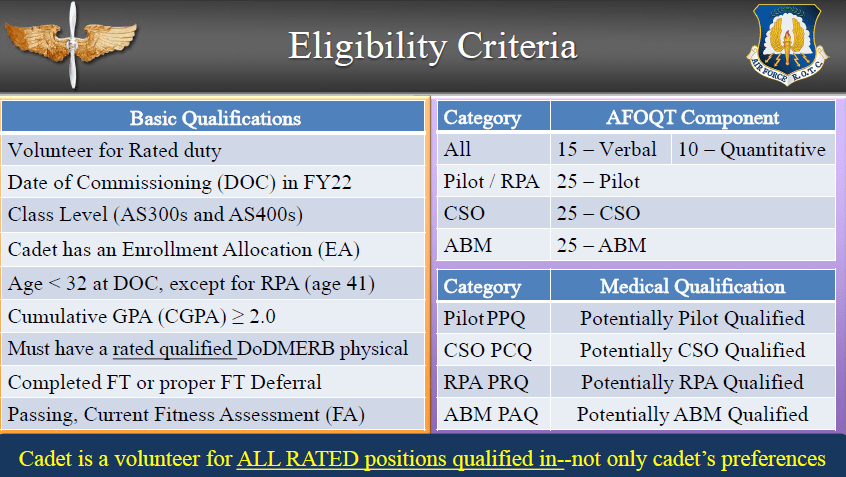
See below for more information on some of these things that may be new to you.
Note that volunteering for the rated board means you are volunteering for any and all of the above rated jobs that you qualify for. You cannot volunteer for just pilot, or just ABM, etc. You do rank your choices, but you cannot say that you only want one or two of the options, and none of the others.
Medical
In order to qualify for the rated board, you'll have to meet preliminary medical qualification in at least one of the rated categories. You can see this qualification at the bottom of your Cadet SURF, pulled from WINGS. At the bottom it'll have the four rated jobs listed with Y/N/R or blank. If it's blank or you have an unexpected result there like N for not qualified, get with the NCO in your detachment that handles medical stuff and make sure all your information is in WINGS. Most people are disqualified based on vision or hearing tests. It is possible to have these things retested and then updated in WINGS so that you qualify for a rated job.
Medical items that factor into your potential rated medical qualification are:
- Standing and sitting height
- Audio test
- Distant vision
- Refraction
- Near vision
- Color vision
- Depth perception
If selected for a rated position, you will later go to Wright Patterson AFB in Ohio for a intensive flying physical, which will be much more in-depth than the DoDMERB exam you had previously.
AFOQT
Below are the AFOQT minimums to qualify for the rated board, and for any of the listed rated jobs. See the AFOQT page for more info on how the AFOQT works. These scores are NOT waiverable.
| Pilot | CSO (Nav) | ABM | Verbal | Quantitative | |
|---|---|---|---|---|---|
| Pilot | 25 | 15 | 10 | ||
| RPA | 25 | 15 | 10 | ||
| CSO | 25 | 15 | 10 | ||
| ABM | 25 | 15 | 10 |
Pilot Candidate Selection Method (PCSM)
The PCSM is made up of three things:
- Pilot AFOQT score
- TBAS score
- Logged flight hours
The Air Force Personnel Center doesn't say how the formula works for the PCSM, but they have shared that the Pilot AFOQT score is the largest contributor to the overall score.
Test of Basic Aviation Skills (TBAS)
The TBAS is a hands-on test, sitting at an old computer with a joystick and rudder pedals. It tests hand/eye coordination, reflexes, spatial awareness, and multi-tasking ability. It's kind of like an old, super simplistic video game.

For instance, above, you would use the joystick to keep the yellow reticle on the red airplane in the upper section, while you use your feet to keep the yellow rectangle over the plane in the lower section with the rudder pedals.
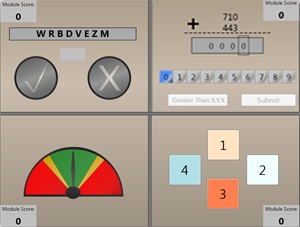
In the above screenshot, you can see the multi-tasking test. You have to do simple arithmetic while also keeping the gauge in the green area, memorizing the letters in the upper left section, and also listening over headphones for your callsign to be called, then clicking a button on the screen in the lower right.
There's really nothing to study for the TBAS. There is no knowledge portion, it's only motorskill performance. There are some flashcards that may help for one section of the test, but that's about it. I'd recommend taking the test at least twice, as that's probably the best way to get better at it, knowing what to expect the second time.
You can take this test up to three times, with a 90-day waiting period between attempts. The scores do not expire.
Flight hours
Logged flight hours will also go into your PCSM. If you have a log book, bring it with you to the test so it can be scanned and sent in with your score. Getting 41 flight hours will max-out this portion of the overall score (it used to be 201).
Logged flight hours mean hours logged in a plane, glider, or FAA approved flight simulator.
You do not have to pay for expensive flight training to be selected for pilot. While it can improve your PCSM score which can improve overall selection chances, it is not required.
My personal advice is to take the AFOQT and TBAS first, to see how you do. If you get a good score, don't worry about flight hours. If you need to improve your score, then you can see about get some hours to improve your score, as well as re-taking the AFOQT and TBAS. I also recommend at least taking an orientation flight in a small plane. Some cadets think they want to be pilots until the reality of it hits them, and then they realize they don't want to do it!
Check your PCSM
You can check your PCSM score here.
Note that the PCSM website is extremely finnicky. You may have to refresh the page a dozen times before it fully loads. Also, make sure you read the CAPTCHA instructions carefully, you don't just type in the numbers/letters like most websites, you have to sometimes write the color of a character. This website requires color vision!
PCSM scores range from 1 - 99.
If not selected
If you're not selected for the rated board, there will sometimes be a supplemental board later in the program to try again. However this is not guaranteed and is totally subject to the needs of AFROTC. You're also automatically placed on an alternate list if not selected but qualified. I have had quite a few cadets be offered a rated job after the rated board, or even have their job 'upgraded' from CSO to pilot.
You will go through the non-rated board process if you don't get a rated job, meaning that you'll input a handful of non-flying job choices and then be given one based on Air Force/Space Force needs. This board will be in your commissioning year.
Rated board on active duty
There are also rated opportunities once you're on active duty. Say for instance you are selected as an Acquisitions Officer out of AFROTC. You can apply to an annual rated board once you're on active duty, and if selected, you'll go through pilot training and become a pilot. However, be aware that you still have to be medically qualified, meet all the normal qualifications, and it's extremely competitive to be selected for this opportunity.
Historical Selection Numbers
Here's a PDF compiled by u/Secondhand-Flapjack on reddit.com/r/afrotc with several years of historical data.
Note that the years may not match up perfectly due to confusion over whether they were academic years, fiscal years, or calendar years. However, it still gives good trend data on numbers you should shoot for for selection.
You can see that some of the results have a listing for Order of Merit. You can use this cadet-created Order-of-Merit calculator to estimate your order of merit. Please keep in mind this is only an estimate.
2011

2014

2015

2016

2017

2017

2018
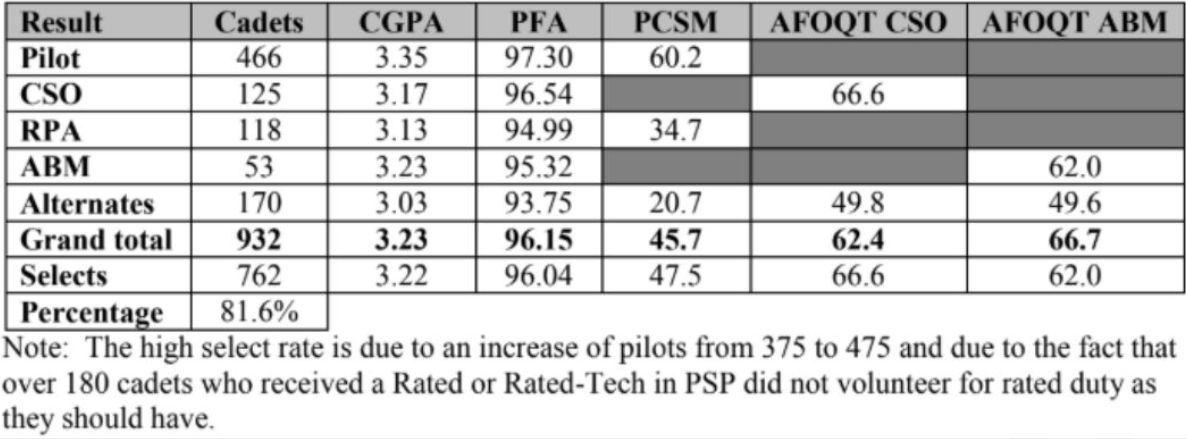
2019

2022
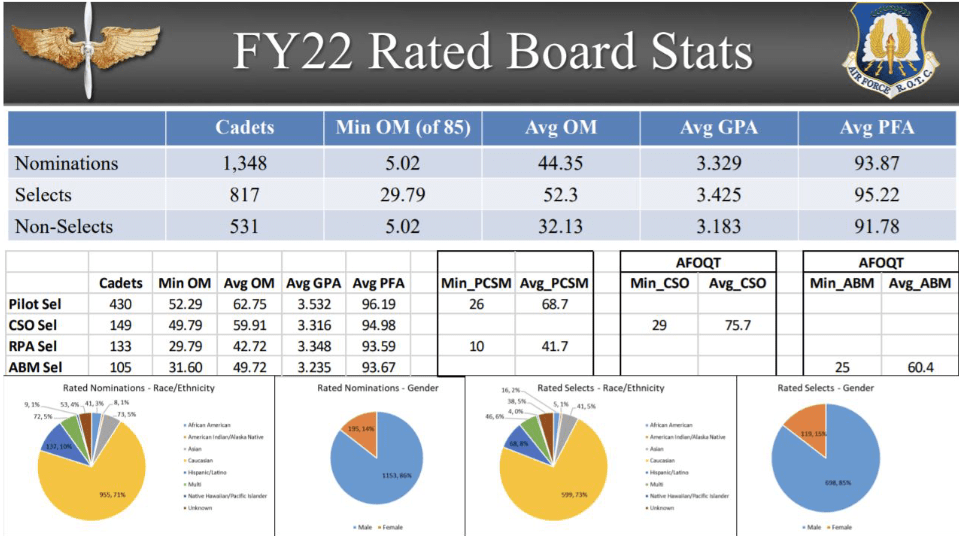
2023
